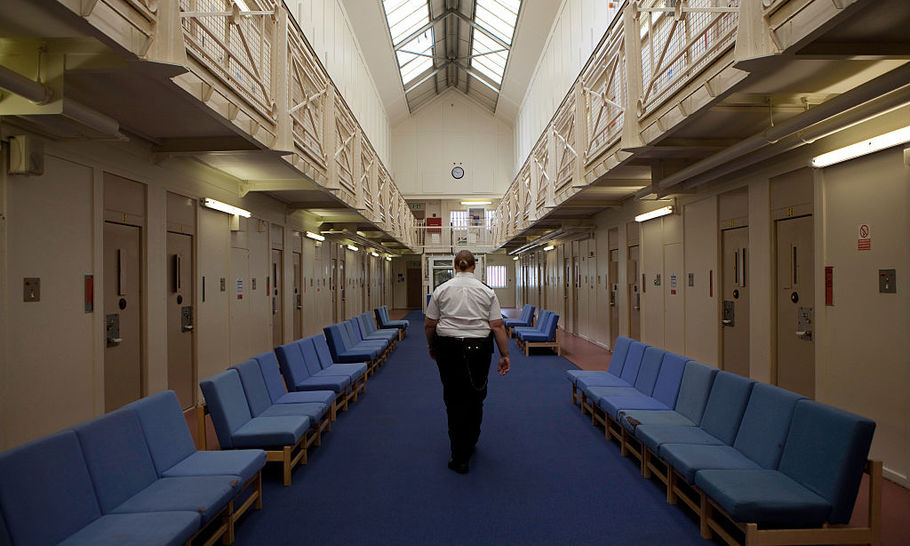Locking women up is expensive - and it doesn't work. It's time for a new tack.

(Photo by In Pictures Ltd./Corbis via Getty Images)
If you didn’t know that the Good Loaf was there, you’d have a job finding it. The cavernous cafe with its enormous bread kitchen, colourful cake display, mini-creche and large, scrubbed wooden tables is tucked away on the first floor of an old shoe factory in a back street, a 20 minute walk from Northampton station.
But The Good Loaf isn’t there to impress passers-by. As I settle down to my toastie and tea (delicious) I look around at my fellow customers: there are the freelancers – a staple of any modern café – hunched over their laptops and sipping feverishly on their espressos, but dotted between them sit frazzled parents trying (in vain) to set up some sort of collaborative activity for their toddlers, young couples enjoying a snatched weekday lunch, and several elderly ladies and gentlemen, who, I’m told, make up the local bereavement group. The place is a community hub – in the truest sense of that hackneyed phrase.
The CEO, a dynamic woman radiating competence, beams as she shows me around the kitchen. And well she might. After jumping through hundreds of hoops, the entrepreneurial managers at The Good Loaf have just found out that they’ve been granted £250,000 from the Ministry of Justice to set up a similar establishment in the north of the country.
Because The Good Loaf isn’t just about good bread. Staffed by a mixture of paid workers, volunteers and women on work placements, the café provides real employment opportunities and emotional and practical support for vulnerable local women to help break the cycle of poverty, unemployment and offending. It is one of 12 successful bidders for a share of the MoJ’s £3.3 million fund, awarded to organisations up and down the country working to help turn women away from crime and reduce re-offending.
A cynic would say (and many did, back when the Female Offender Strategy was launched in June) that the Government’s newfound obsession with diverting women away from prison and into community support stems from the dawning realisation that prisons are gobbling up a truly alarming amount of Treasury cash – and spectacularly failing to produce any positive headlines in return. And there’s some truth in that. The £3.3million the MoJ is using for this first wave of community funding is only available because the Government has shelved plans to build five community prisons in England and Wales – which would have come to rather a lot more than £3.3million.
But looking at the figures behind female offending, it’s tricky to find a compelling case for the ‘build more prisons’ argument. Women make up a vanishingly small minority of those in the criminal justice system, representing less than five per cent — and in all but the most exceptional of circumstances, the crimes that get them incarcerated are petty.
In 2016, more women were sent to prison to serve a sentence for theft than for violence against a person, robbery, sexual offences, fraud, drugs and motoring offences combined — and 80 per cent of those locked up for theft were shoplifters. Last year 8,447 women (very few of whom posed any real threat to their communities) were put behind bars, at a cost of around £1.7bn to the taxpayer. 71% of them were jailed for under a year, and past figures suggest that 56% of them will go on to commit more crime after being released.
Offering money to community projects like The Good Loaf may be a cheaper option, but from what I can see, it’s a better one. And Chantel, who completed her six week programme a year ago after being referred to the cafe to do community service, agrees. “It sounds weird, but getting in trouble was probably the best thing that ever happened to me”, she says over coffee. “I left domestic violence, which was quite stressful really, but I got the help and support I needed from the ladies here, who made me realise that there is so much more to life than the life I was living. God knows where I would be without this place, but I’ve got my confidence back now, and I’m pretty sure I could get a job in any catering business now”.
She’s quite right, I’m sure (she’s eloquent, bubbly and would be an asset to any front of house team) but it sounds like the cafe would be sorry to lose her. After completing the programme and earning her Level 1 AIM Award in Employability, Level 1 AIM Award in Volunteering, and Level 2 Certificate in Food Safety, Chantel got herself a job as a paid employee in the cafe and now mentors other women taking their first steps to employment at the Good Loaf. Her young children (she’s a single mum) are happily playing in the mini-creche while she works, watched over by a friend she met on the programme.
If the Secretary of State for Justice is serious about the programme, the MoJ will have to give grants to more than 12 organisations. But if you ask me, David Gauke, (the fourth minister to hold the post in as many years) is onto something. Instead of pumping billions into the black hole of the centralised prison sector, or farming out rehabilitation programmes to private contractors (when will they learn?), the Government should be acting like real Conservatives, and giving dynamic, local organisations like The Good Loaf the little leg up they need to help them transform their own communities.





